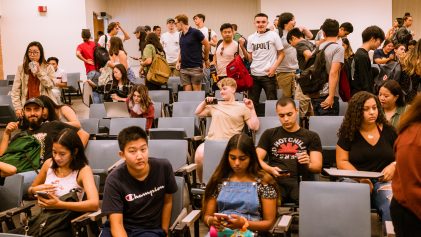Living with LMSes
Long Beach State University uses a Learning Management System (LMS) called D2L (Desire 2 Learn). LMSes are online software applications for administering educational courses. They first appeared around the same time as Wikipedia.
Busy students have come to love one-stop LMSes. LMSes with a homogenized, uniform organization of all their coursework. A tame educational experience. Presented in easily digestible chunks.
Is that why we came to the university? For a tame experience?
Easiness
Rate My Professors reviews suggest that easiness is the primary criterion students judge classes by.
Is that why we came to the university? For an easy experience?
2001: a knowledge odyssey
In 1751 Denis Diderot & Jean le Rond d’Alembert invented the encyclopedia. 250 years later, in 2001, Jimmy Wales and Larry Sanger invented Wikipedia. Diderot & le Rond d’Alembert’s vision was to collect and share the world’s knowledge. Or at least share it with the 4,250 people lucky enough to afford a copy. Wales & Sanger’s vision was to share knowledge with anyone who could access The Internet.
Neutral Point of View
A core tenet of Wikipedia is that all articles have a neutral point of view. In a world filled with bots, trolls, and fake news, presenting factual, documented material with a neutral point of view is an achievement.
Or is it?
Facts
Facts are important.
But they are not always what we need. Or not what our souls need. Facts may keep us alive, but facts are not what we live for. Wikipedia and Google can answer almost any factual question in under 60 seconds. But how useful is the 60-second answer to a question? We didn’t come to college to learn to use Wikipedia and Google, did we?
We came to college to answer the questions that Wikipedia and Google cannot answer.
Neutral Point of View is code for Death of the Author
A sentence that contains personality, isn’t neutral point of view. It doesn’t belong on Wikipedia. But, don’t we live for personality? Wikipedia is an extraordinary resource. But that resource comes at a price. The death of the author.
Before Wikipedia’s 2001 launch, the web was crawling with unique websites. A high school biology teacher’s website on some obscure species of frog that lives in her area. A website with images and facts. But also a website with that biology teacher’s life and style and personality. Beyond facts, a website embodied by a human being.
After the rise of Wikipedia, all those idiosyncratic websites went away. Those that remained haven’t updated since 2001. Wikipedia killed the author.
Fluorescent lit rooms
Yes, LMSes are efficient. If you want to read a paper book, a fluorescent-lit room is efficient. Yet nobody wants to read in a fluorescent-lit room. There is a harsh, unsettling, inhuman quality to a fluorescent-lit room. We prefer daylight. Or incandescent light. Or LED light with a pleasant color temperature.
LMSes are the fluorescent-lit rooms of education.
You can do the necessary things in a fluorescent-lit-LMS. But is that what college is? The repetition of prescribed necessary things? Or is college a vision quest with a flickering torch through an unknown cave?
An LMS may make for an easier college experience. But it doesn’t make for a better experience. Websites and blogs are among the most extraordinary innovations of our age. It breaks my heart that they’ve become obsolete in less than a single generation.
Who needs a website when you’ve got Desire2Learn, or Facebook, or Instagram? There are so many tools controlled by other people.
Rediscovering Speech
In 1850 it cost $10,000 to launch a newspaper. In 1950 it cost $10,000,000. In 1850 you could launch a newspaper for any reason. 100 years later you needed a business plan and venture capital. The web gave back the voice we lost when independent publishing became unaffordable. And in less than a generation, we gave away that freedom for the convenience of Facebook & Instagram.
A Website of Your Own
I love having a website dedicated to each of the classes that I teach. It’s more work for me. And it might be less convenient for students. But instead of plugging our lives into somebody else’s spreadsheet, a website is a chance to be an author. To share points of view. To walk, with a mix of courage and fear, through an unknown cave with a torch that lights only a small way ahead.
Silos vs Open Courseware
Another aspect of LMSes is that they are closed. Out of the entire world’s population, only the handful of students enrolled in the course right now have access to the course content. Denis Diderot and Jimmy Wales would be so disappointed. Why do we put knowledge in silos? Why don’t we join other universities in the Open Courseware movement? A movement where materials are accessible to anyone with a hunger for knowledge.
Even the handful of students who currently have access to LMS content are locked out next semester. If course materials are worth anything, shouldn’t students have access to them for as long as they like?
We have trained students to settle for less
A few years back students complained about how much they hated the university’s LMS. Now that a few generations of students have become addicted to LMSes, they have become dependent on their familiarity. They are uncomfortable using a website dedicated to the topic they are studying.
I do my best to tailor courses to the insights from student feedback. But on this one, I must resist. LMSes like BeachBoard/Desire2Learn are the fluorescent-lit rooms of education. When you don’t know there’s any other way of being, you settle for it.
LMSes represent a degraded college experience.
I resist.


Comments? Questions? What great art did you see, make, or experience today?